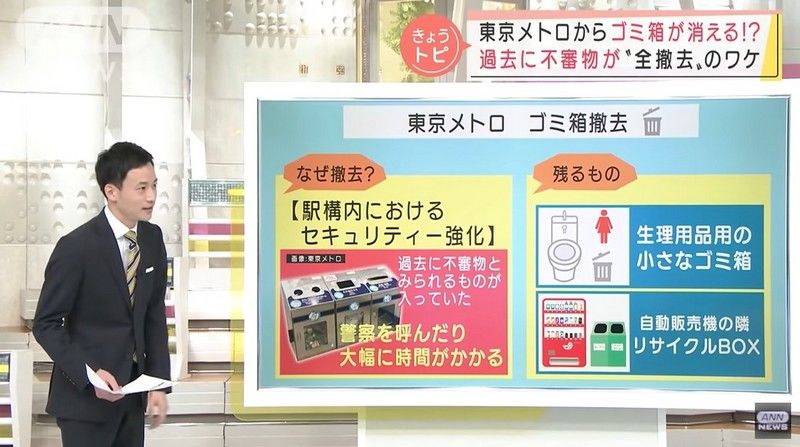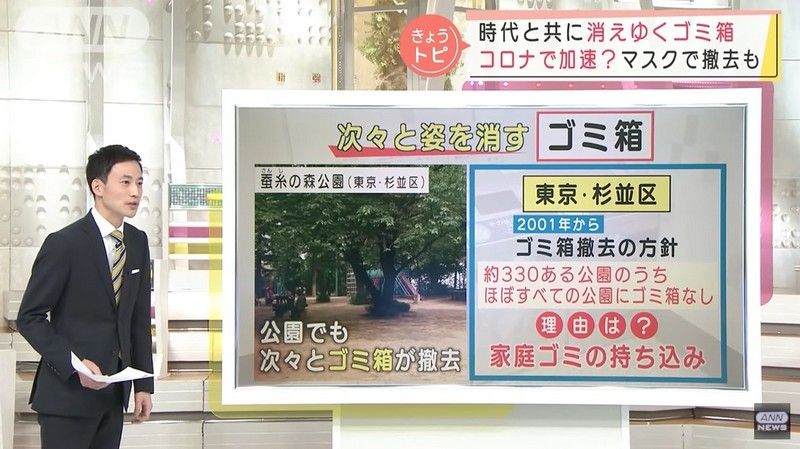Why are there fewer and fewer public trash cans on the streets of Japan?
Tourists who have been to Japan in the past 1 to 20 years should have noticed that public trash cans on the streets are becoming more and more difficult to see. Could it be that the trash can has been stolen? Of course it wasn't stolen, but in today's Japanese society, some people really steal things that seem to be of little value. Even the flower pots and small decorations in front of the store are taken away. Even the shrine's [sai money box] (Chinese: merit box) dares to steal money in front of the gods.
In the past, trash cans were everywhere on the streets of Tokyo. It was not until 1995 that after the sarin gas distribution incident on the Tokyo subway, the trash cans in many stations across the country were closed and gradually decreased. Since then, it has been relocated, and after the 9/11 terrorist attacks in the United States in 2001, it has begun to close the trash can again.

The reasons for the reduction are listed below
Anti-terrorism
Although there are few terrorist attacks in Japan (it is not quite correct to say that, indiscriminate murder is also a kind of incident, and there have been many cases in recent years), cautious Japanese people use trash cans to hide dangerous items such as poisonous gas and bombs in order to prevent terrorists from hiding. , began to reduce the number of outdoor trash can settings.
Handling suspicious items, wasting station staff and police resources
Because there is a precedent, after the poison gas incident, various railway companies have widely publicized that if unknown suspicious items are found in the station, they hope that passengers will not check it by themselves, but report it to the staff as soon as possible and let them deal with it. Station staff will usually notify the police and deal with suspicious items together. Under normal circumstances, most of them are not dangerous goods, but they take a lot of time.

Epidemic prevention measures
Passengers do not wrap their used masks and throw them into public trash cans, increasing the risk of infection for staff.
household waste
Household garbage in Japan has very strict classification regulations, and the types of garbage that can be discarded every day are also different. Sometimes, if you miss the disposal time, you need to wait for the next round. Some people find it troublesome, and secretly take the garbage at home to the trash can outside for disposal. Public trash cans in parks and convenience stores are their best targets. Although the managers of these places put up signs telling them not to throw household waste here, it is just that they are repeatedly prohibited and cannot be prevented. The last is to close public trash cans; convenience stores will relocate trash cans set up outside the store into the store.

Wild animals dig through kitchen waste
There are many wild crows in Japan, especially in densely populated metropolitan areas. Because people throw away a lot of food waste, crows basically rely on this food waste to live, and they are smart by nature and know how to open the trash can lids to rummage. A crow can peck through even tightly tied garbage bags to find the food he wants. Scattered garbage will attract other wild animals such as wild dogs and cats to forage. There is no better way to solve such a problem, and we have to resort to the simplest and most effective way to remove these outdoor public trash cans.
save money
If trash cans are set up, it must be cleaned regularly by personnel, and the cost of cleaning personnel is also a big burden. In addition, due to the epidemic, people have reduced going out, and the income of various transportation companies has been greatly reduced. For example, the removal of trash cans will at most cause passengers a little inconvenience, but it can save money, so it must be prioritized.
How do Japanese people deal with the garbage generated when they go out?
In fact, the Japanese have done a good job at this point, which is commendable. Most people take their trash home or take it to a company for sorting and disposal.
According to my observation, this should have a lot to do with the herd mentality in the Japanese personality. When no one is littering within sight, others will follow suit. Taking an escalator is an obvious herd mentality. The previous person stands on the left side of the escalator, and the person who follows closely will also stand on the left side. Even if a person in Tokyo is used to standing on the left, when he arrives in Osaka, he will naturally follow the person in front of him and stand on the right. You read that right, the habits of these two places are different. Osaka people are used to standing on the right. For some reason, there is a confrontation between these two places, and they often don't like each other, and even the escalators are in opposite positions.
When there are fewer and fewer trash cans on the street, wouldn't the Japanese complain that it's inconvenient? Complaining, of course, but only verbally, and complaining about each other on social media for a while and then subsides. To ask them to put down their mobile phones and go out to protest in the streets, maybe the weight of the event of removing the trash can is not serious enough. Despite the epidemic in the past two years, large-scale protests are very rare. It was rarely seen before the outbreak.
Stylish carry-on trash bag
In other words, some people find it inconvenient, and some people think it is a business opportunity. Some manufacturers have introduced carry-on garbage bags. Although they are expensive, there are many people asking about them. Some people may think that if you just use a plastic bag that you don't need to put garbage in, it will end, so why spend money on this kind of thing. Maybe this is the characteristic of some consumers. As long as their pain points can be solved and the appearance design is fashionable enough, they are very willing to pay for it.

2022/01/16 posted.
Like my work? Don't forget to support and clap, let me know that you are with me on the road of creation. Keep this enthusiasm together!

- Author
- More